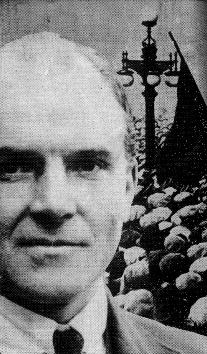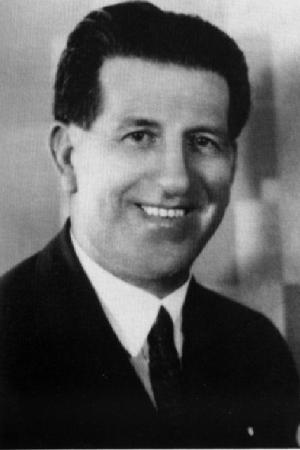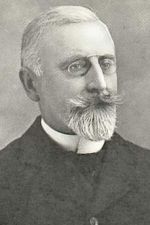Ga
Gäbel, Otto (1885–1953) .
Bookbinder, in SPD (Sozialistische Partei Deutschlands, Social-Democratic Party) in 1905. In 1914 published opposition’s first documents with his comrades in Niederbarnim group. Member of Spartacus League, did not join KPD(S) on its foundation, but remained in USPD, in leadership of Left. Joined VKDP (Vereinigte Kommunistische Partei Deutschlands/United Communist Party of Germany) in 1920, elected to Zentrale. In December 1921 supported Brass against Zentrale, but did not join KAG. Then in charge of Kommunistische Partei-Korrespondenz and Secretary of Reichstag fraction. Municipal councillor in Berlin. Compromised in financial scandal, expelled from KPD (Kommunistischen Partei Deutschlands/German Communist Party) in 1929, and later sentenced to prison. No subsequent political role, died in West Berlin.

Galileo, Galiliei (1564-1642)
Italian physicist and astronomer; the founder of experimental science. In a world dominated by the dogmatic enforcement of the teachings of Aristotle, Galileo used the systematic application of the experimental method to formulate the most basic laws of mechanics - inertia and the principle of the relativity of motion. By applying the telescope to observation of the skies, Galileo proved the validity of Copernicus's heliocentric system. Galileo thus developed a scientific method based on observation, experiment and the method of induction and a mechanical, causal conception of Nature. As is well-known, Galileo suffered severe repression from the Church for his views, and was forced to write God into his system.
A good exposition of his works can be found in "The Galileo Affair", which collects together a series of letters and statements by Galileo with the documents of the Inquisition demanding that Galileo recant and affirm the literal interpretation of the Bible upheld by the Inquisitors. The final document is Galileo's "self-criticism".
In 1600, the great Italian materialist philosopher, Giodarno Bruno, had been burnt at the stake for, among other things, upholding the Copernican conception of the Heliocentric universe, and despite the fact that Copernicus had been commissioned by the Church to formulate a better method of predicting the movement of the heavens in order to overcome defects in the Calendar, he was also forced to recant.
Not only are Galileo's arguments in defence of the Copernican view compelling to the point where it is difficult for us to comprehend today how the Inquisitors could withstand them, but Galileo also demonstrates that they may silence him in vain, for conditions of life in Europe were leading more and more people to observe with their own eyes the movement and form of the heavenly bodies, and more and more people were coming to the same conclusions as he, and the Church would do well to stay away from anything that might prove liable to refutation by empirical obervation or naturalistic reason.
In this short article, the profundity of Galileo's understanding of the nature and tasks of natural science is astounding. Not only does he present the argument in favour of the Heliocentric System with a fine balance of empirical evidence and the evidence of Reason, but he very explicitly rejects the "compromise" offered him - to admit that the heliocentric assumption is made solely "for the convenience of organising the observations", and not at all a statement that material bodies actually move in this way, outside of human perception! Right at the very beginning of the development of natural science then, we see its greatest advocate recognising positivism in the camp of theology! On the contrary, he says, astronomers have to reduce the positions calculated on the basis of a theory of objective heliocentric motion to lines-of-sight referred to the point of view of an Earthly observer in order to be able to utilise the mass of experiemental data, all of which is made by Earth-bound human observers - in other words the germs of the twentieth century Principle of Correspondence, used by Einstein in his formulation of the Special Theory of Relativity.
Also, we see a clear formulation of the principle of relativity, and the conception of the distinciton between Essence and Appearance, inso far as Galileo distinguishes between the "idealised" motion and the minor "deviations" from that trajectory.
Galilieo also did fundamental work on mechanics, rolling balls down inclined slopes and timing them with a very primitive "stop watch".
Further Reading: Galilelo: On the Copernican Opinion.

Gallacher, William (1881-1965)
Leader of the Shop Stewards Movement in Britain in the early part of the 20th Century. President of the Clyde Workers Committee during the great struggles of 1916, imprisoned twice during the war for strike activities, he was one of the ‘left’ Communists whose ‘infantile disorder’ was analysed in Lenin’s pamphlet. He attended the Second Congress of the Communist International in August 1921, and on his return helped form the Communist Party of Great Britain. Before the 1926 General Strike, he was one of the CP leaders held in prison. In the 1920s, he developed into one of Stalin’s main supporters in the Comintern. In 1935 he was elected MP for West Fife and retained the scat until 1950. He died a devout Stalinist.
Gapon, Georgi Apollonovich (1870-1906)
A Russian priest, leader of the Assembly of Russian Factory Workers of the City of St. Petersburg. On January 9, 1905, Gapon organised, with provocative aims, a peaceful procession of workers to the Winter Palace to present a petition to the tsar. The unarmed workers were shot down in what would be called Bloody Sunday. Gapon was himself wounded.
After this Gapon emigrated abroad, where he joined the Socialist-Revolutionary Party, then returned to Russia illegally, and resumed contact with the tsarist secret political police. He was assigned to help dismantle the workers organizations which he helped to build. Gapon was killed by the S.R.s.
Garbutt, Douglas
Joined Workers International League. Affiliated with the “Trotskyist Opposition” faction. Enlisted in RAF and stationed in India, 1943-45. Worked with the Bolshevik Leninist Party of India in Calcutta, Madras, and Bombay. Left India in August 1946.
Compiled by Charles Wesley Ervin

Garden, Jock
Born in Scotland; came to Australia in 1900; ALP member 1904, candidate in 1913 & 1916. Member of the Clerk's Union from 1907, and secretary of the NSW Labor Council from 1918. where his group was known as the 'Trades Hall Reds'. After the 1917 Revolution, Garden formed the Industrial Vigilance Council with the aim of transforming the ALP into a revolutionary party. Expelled from the ALP in 1919. Joined the de Leonist SLP.in August 1919, but expelled in November 1919 for publishing the Manifesto of a 'secret communist party' with some of those trade unionists who had left the NSW ALP, WP Earsman and members of the Victorian Socialist Party (VSP). It was this 'secret Communist Party' which issued the call for the founding of a CPA. Following an early split, Garden's group was recognised by the Comintern in August 1922. Garden won support among militant unionists and conducted a successful intervention at the All-Australian Trades Union Congress of 1921, at which 15 per cent of the delegates were members of the CPA. After the ALP banned the CPA, Garden proposed continued secret membership to avoid isolation, but in 1926 Garden led his supporters in the NSW Labour Council out of the Party, after defying CPA policy by supporting a left break-away from the Queensland ALP. Jock Garden drifted out of the CPA mainly due to the conflict between retaining leadership in the trade union movement while being publicly identified with positions which were minority positions even in the organised working class. Remained a part of the Red International of Labour Unions and the Pan-Pacific Trade Union Secretariat, breaking only when denounced as 'social fascists'. Garden then became the driving force behind the powerful 'socialisation' movement of the period of Lang's ALP Premiership in NSW. Garden was a powerful and eloquent speaker and a skilled organiser. Although never regarded as a 'theorist', he was a formidable political operator.

Gaultier, Jules de (1858-1942)
Jules de Gaultier spent his philosophical career in opposition to what he called in the title of a book published in 1922, “official philosophy.” He never held an academic position, working instead for the Ministry of Finance, publishing books and articles, and residing in provincial Boulogne-sur-Mer most of his life. An early supporter of the ideas of Friedrich Nietzsche, his 1900 “De Kant à Nietzsche” presents Schopenhauer and Nietzsche as alternatives to the Kantism then regnant in the philosophical world. His greatest contribution is the concept of “bovarysme, “which he initially developed in his 1892 “Le Bovarysme, la Psychologie dans l’Oeuvre de Flaubert” (“Bovarysm, or Psychology in the Oeuvre of Flaubert”) and which he elaborated on in “Le Bovarysme, Essai sur le Pouvoir de l’Imagination,” (“Bovarysm, Essay on the Power of the Imagination”) published in 1902. Bovarysme is defined as “man’s power to conceive himself other than he is,” i.e., the power of our imagination to overwhelm our true natures, of our imagination of the coloration of situations to lead us to misinterpret these situations. Gaultier found the basis for this theory in Flaubert’s character Emma Bovary, whose (fictional) life came to a sad end because the character viewed all around her, all that occurred to her through the prism of her romantic notions. Starting with the application of his theory to the individual, Gaultier expanded his use of this concept to history and human society, with nations misleading themselves concerning their true nature , their “national genius,” and history in general being viewed through a false prism. The theory thus has a negative and a positive character: it leads individuals and nations to misjudge themselves, but it also implies the ability to act, to escape the boundaries one has been set.
Gaultier played a central role in precipitating the suicide of his former friend, the individualist philosopher Georges Palante. Gaultier had helped Palante succeed him as philosophy critic at the “Mercure de France, “ and their relations had always been more than cordial. But an unfavorable review by Palante of Gaultier’s “La Philosophie officielle et la Philosophie” in 1922 led to an unpleasant exchange of correspondence, which finally led to Gaultier’s challenging Palante to a duel. For the rest of his days Palante felt himself to have been rendered ridiculous by the process. Stéphane Beau says in an essay on the relations between the two men that “the duel manqué certainly weighed among the burdens that made [Palante’s] life unbearable, but the connection is too tenuous for us to read a cause and effect relation” between it and Palante’s death. There is no question though that it was a contributing factor, and he committed suicide in 1925.
Mitchell Abidor
See Gaultier Archive